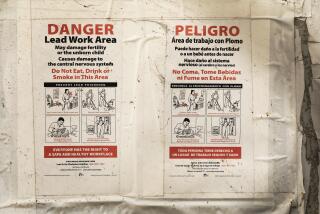Agency rethinks its rules on testing products for lead
- Share via
The Consumer Product Safety Commission has given preliminary approval to changes in new lead-testing rules after complaints that the measures could have forced thrift stores and sellers of handmade toys to dispose of merchandise or even go out of business.
If formally adopted, the changes approved on a first vote Tuesday would grant exemptions to last year’s Consumer Product Safety Improvement Act, which seeks to ensure that products for children do not contain dangerous amounts of lead.
As currently written, the act would require all products aimed at children 12 and under to be tested for lead and phthalates starting Feb. 10. Phthalates are chemicals used to make plastics more pliable.
Large manufacturers and retailers say the cost of testing will not be a burden. But small businesses such as handmade-toy shops and thrift stores say the requirement would force them to spend tens of thousands of dollars to test products such as clothing, in which the threat of lead is almost nonexistent. Many thrift stores said they would be forced to stop selling children’s clothing or close altogether.
The commission’s two members (a third seat is vacant) voted tentatively to exempt:
* Items with lead parts that a child cannot access;
* Clothing, toys and other goods made of natural materials such as cotton and wood; and
* Electronics that are impossible to make without lead.
The commission also tentatively approved a rule that clarifies how it determines exclusions from the law.
The vote opens up a 30-day public comment period that will begin when notice of the rules are printed in the Federal Register. Interested parties can find out how to submit comments by https:// www.cpsc.gov/about/cpsia/cpsialist.aspx “> www.cpsc.gov/about/cpsia/cpsialist.aspx from the CPSC at www.cpsc.gov .
No final rules will be approved until after Feb. 10, when the testing rules go into effect.
That means retailers and manufacturers who sell untested children’s merchandise would technically be in violation of the new law starting Feb. 10. Whether federal regulators will enforce the rules -- which might entail inspections at thousands of secondhand stores and toy shops across the country -- is another question.
“The CPSC is an agency with limited resources and tremendous responsibility to protect the safety of families,” said Scott Wolfson, a CPSC spokesman. “Our focus will be on those areas we can have the biggest impact and address the most dangerous products.”
--
More to Read
Inside the business of entertainment
The Wide Shot brings you news, analysis and insights on everything from streaming wars to production — and what it all means for the future.
You may occasionally receive promotional content from the Los Angeles Times.











